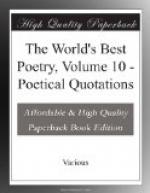Put out the light, and then—put
out the light.
If I quench thee, thou flaming minister,
I can again thy former light restore,
Should I repent me; but once put out thy
light,
Thou cunningest pattern of excelling nature,
I know not where is that Promethean heat,
That can thy light relume. When I
have plucked thy rose
I cannot give it vital growth again,
It needs must wither.
Othello, Act v. Sc. 2. SHAKESPEARE.
Death loves a shining mark, a signal blow. Night Thoughts, Night V. DR. E. YOUNG.
Death aims with fouler spite
At fairer marks.
Divine Poems. F. QUARLES.
The ripest fruit first falls. Richard II., Act ii. Sc. 1. SHAKESPEARE.
The good die first,
And they whose hearts are dry as summer dust
Burn to the socket.
The Excursion, Bk. I W. WORDSWORTH.
Happy they!
Thrice fortunate! who of that fragile mould,
The precious porcelain of human clay,
Break with the first fall.
Don Juan, Canto IV. LORD BYRON.
Loveliest of lovely things are they,
On earth that soonest pass away.
The rose that lives its little hour
Is prized beyond the sculptured flower.
A Scene on the Banks of the Hudson. W.C.
BRYANT.
“Whom the gods love die young,” was said of yore. Don Juan, Canto IV. LORD BYRON.
Ere sin could blight or sorrow fade,
Death came with friendly care;
The opening bud to Heaven conveyed,
And bade it blossom there.
Epitaph on an Infant. S.T. COLERIDGE.
Thank God for Death! bright thing with dreary name. Benedicam Dominos. SARAH C. WOOLSEY (Susan Coolidge).
But an old age serene and bright,
And lovely as a Lapland night,
Shall lead thee to thy grave.
To a Young Lady. W. WORDSWORTH.
Death is the privilege of human nature,
And life without it were not worth our
taking:
Thither the poor, the pris’ner,
and the mourner
Fly for relief, and lay their burthens
down.
The Fair Penitent, Act v. Sc 1. N.
ROWE.
Death! to the happy thou art terrible,
But how the wretched love to think of
thee,
O thou true comforter, the friend of all
Who have no friend beside.
Joan of Arc. R. SOUTHEY.
I would that I were low laid in my grave;
I am not worth this coil that’s
made for me.
King John, Act ii. Sc. 1. SHAKESPEARE.
He gave his honors to the world again,
His blessed part to heaven, and slept
in peace.
Henry VIII., Act iv. Sc. 3. SHAKESPEARE.
O, that this too, too solid flesh would
melt,
Thaw, and resolve itself into a dew;
Or that the Everlasting had not fixed
His canon ’gainst self-slaughter.
Hamlet, Act i. Sc. 2. SHAKESPEARE.




